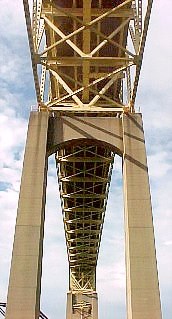When it first opened to traffic on October 31, 1962, the Sault Ste. Marie International Bridge was proudly referred to by politicians using words such as "magnificent," "outstanding," and "majestic."
Ontario Premier John Robarts met at the centre of the two-mile-long span with Michigan Governor John Swainson to cut the ribbon.
"I view the new International Bridge between the Cities of Sault Ste. Marie," Premier Robarts said, "as a major step forward in cementing relations between our two countries."
Today, however, a $39,813 item in the bridge's $4.8 million operating budget has become an international bone of contention.
In recent weeks, strong words have been exchanged over the Joint International Bridge Authority (JIBA)'s plan to cancel the bridge bus, which carries pedestrians between the two cities.
There's even talk of a lawsuit to enforce what the City of Sault Ste. Marie, Michigan says is a legal obligation to provide some form of cross-border pedestrian access.
Lines in the sand
Here's a brief guide to where the lines are being drawn, and who's on which side:
- The City of Sault Ste. Marie, Michigan argues, in a position developed by City Manager Spencer Nebel and City Attorney Steve Cannello, that JIBA has both a legal and moral duty to continue operating the bridge bus. Earlier this month, Cannello said that legal action may be taken over the issue. Background
- Bud Mansfield, a member of the JIBA board, has written an angry response to Nebel, accusing him of distorting the issues and trying to get his way by hinting at a "frivolous lawsuit."
- JIBA says it agrees with most of what Manfield says, and argues that Nebel is overstating the bridge authority's obligations.
- Nuala Kenny, assistant City solicitor for the City of Sault Ste. Marie, Ontario, agrees with the bridge authority, arguing that there's no legal basis to force JIBA to maintain the bridge bus.
City of Sault Ste. Marie. Michigan
At a meeting late last year, the City Commission of the Michigan Sault voted unanimously to instruct its adminstration to develop strategies to save the bridge bus, which has been part of the International Bridge operation since it opened to traffic in 1962.
The following are excerpts from recent correspondence written by City Administrator Nebel:
"I have spent some time researching this matter and it is my opinion that JIBA has an obligation to meet the needs of pedestrians through a reasonably priced bus system."
"This opinion is based on a review of both Canadian and state legislation regarding the establishment of the International Bridge."
"In reviewing the 2000 amendments passed by the Michigan Legislature of Act 99 of 1154, nothing significantly changed the responsibility of the Authority to continue providing services for pedestrians needing to cross the International Bridge. This language remained in tact [sic]."
More quotes from Spencer R. Nebel
"It is the position of the City of Sault Ste. Marie, Michigan that the bridge bus is a required component of the operation of the International Bridge to meet the transportation needs of pedestrians travelling from one city to another city."
"It is also our position that the Joint International Bridge Authority can establish reasonable fares for utilizing the bridge bus, but any subsidies must be borne by JIBA and (like all other operational costs for the bridge) may need to be supported by vehicular fare revenues."
"The actual cash subsidy paid last year for the operation of the bridge bus by JIBA was reported to be $39,813 (U.S.) This amounts to just 0.84 percent of the International Bridge's overall revenues of $4,757,000 (U.S.) during the same year."
"Furthermore, one can imagine, in reviewing the development of the International Bridge, that options were discussed regarding how to handle pedestrians travelling between the two Saults."
"Undoubtedly, planners certainly discussed the provision of a walkway at some point during preliminary bridge design. If a pedestrian walkway was included in the original bridge, there is no doubt that the original capital cost and the ongoing maintenance cost of this walkway would far exceed the cost of the subsidy paid over the years for the bridge bus by the International Bridge."
Bud Mansfield's angry response
The following are excerpts from a letter written to Spencer Nebel by Francis "Bud" Mansfield, a member of the JIBA board:
"I was very disappointed in both the tone and the contents of a letter you sent to the members of the Joint International Bridge Authority."
"Among other things, you have taken an issue of public policy and distorted it into a claim that the Authority is failing to follow the law. And then you sent copies of that misinformation to numerous other people!"
"It was offensive to me when you appeared to suggest that the JIBA members are either unaware of the context of their own enabling legislation or are far less capable than you when evaluating the requirements of the Act."
"It may surprise you that but each of the members has in our possession a copy of Michigan Act 99 of 1954, Michigan Act 99 of 1954 as amended by P.A. 243 of 2000, Michigan House Legislative Analysis Report for Public Act 243 of 2000 and the International Agreement for the International Bridge."
More from Bud Mansfield
"We may even have a few other documents that are not in your possession. In addition, an attorney for the International Bridge Administration and an attorney for the Canadian St. Mary's River Bridge Company attend our JIBA meetings."
"We acknowledge that it is still possible for us to get misinformation but we suspect that you may have the same problem."
"It is also obvious that during your extensive research, you have ignored the terms of the owners' (Michigan Department of Transportation and St. Mary's River Bridge Company) mandate which requires the JIBA board to operate the bridge from funds derived from bridge tolls and maintain it in a safe and viable manner."
To continue reading this article, please click here.
